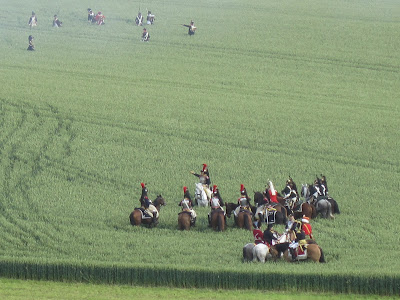One month ago, I celebrated the 197th anniversary of
Napoleon's defeat at Waterloo by waking up early on a Sunday morning and taking
the commuter train about 15 kilometers south of Brussels and walking another 5
kilometers down road and muddy path to watch a reenactment of the battle. The
Napoleonic Bivouac is a big production, although not quite real battle-sized -
that would require 190,000 re-enactors. You can wander through the camp and eat
period meals with the battle re-enactors. I went for the cheaper option,
devoting just a couple hours to Waterloo and checking out the free battle at
Plancenoit.
Thanks to my Belgium and Luxembourg Lonely Planet which I grabbed
before heading out, I realized that the battle being staged that morning was in
a town 6 km from the Braine-l'Alleud train station. Plancenoit was actually a
side battle. Napoleon needed to defeat the Prussians before they met up with
the British and outnumbered his French troops. He succeeded, except they
regrouped and he had to send a detachment to fight them on during the main
battle on June 18. Unfortunately the local bus to Plancenoit was only running
every two hours on Sunday. We got on the bus back to Brussels with everyone
else and got off at the Butte du Lion, a huge grass pyramid visible from the
train and highway which marks the spot where the Prince of Orange, William II,
was knocked off his horse by a musket ball during the battle (William was OK
and took the Dutch throne in 1840 - but the Dutch had the prerogative to build
the biggest monument as Waterloo was on Dutch territory during the battle and
during the 1820s when they built the hill, before Belgium declared independence
in 1830). At the Waterloo museum by the lion, we were told to take a right at
the traffic light and walk 5 kilometers.
Our reward was a great view of the battle, standing on a
hillside and watching the movements of infantry and cavalry on the other side
of a ditch. It's all far more orderly than modern warfare, or even the wilder
Yankee style that I saw on display at Saratoga, New York in a re-enactment of
the 1777 key battle of the Revolutionary War. I didn't see many Prussians at
Plancenoit either, re-enacting seems to be more popular with the British who
weren't involved in the actual side battle. They showed off some of
Wellington's tactics, including his patented hedgehog formations (soldiers
bunched up with bayonets out to ward off attacks by cavalry).
Volunteer history buff soldiers don't particularly like to
play dead, of course, and occasionally you see a supposed casualty get up and
rejoin the fight (one guy seemed to have trouble getting up, however - and his
comrades just checked in on him periodically). But all in all it was good fun,
and we even got to experience the mud that changed the course of history on our
walk. Plus I made it home for lunch. I figured the museums and restaurant weren't
worth it with the crowds.
The museums might be worth a visit sometime, except I'm back
in the USA now. But seeing the battle adds some flavor. The trip to Waterloo
should be particularly interesting for the 200th anniversary in 2015.




















